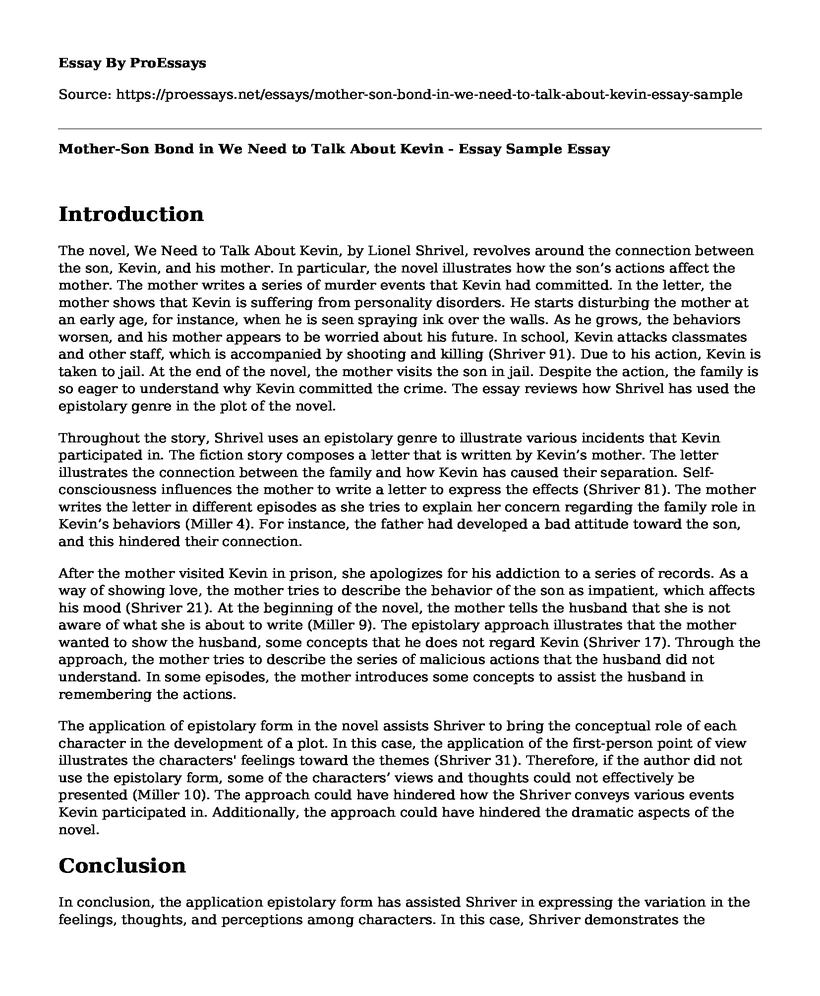Introduction
The novel, We Need to Talk About Kevin, by Lionel Shrivel, revolves around the connection between the son, Kevin, and his mother. In particular, the novel illustrates how the son’s actions affect the mother. The mother writes a series of murder events that Kevin had committed. In the letter, the mother shows that Kevin is suffering from personality disorders. He starts disturbing the mother at an early age, for instance, when he is seen spraying ink over the walls. As he grows, the behaviors worsen, and his mother appears to be worried about his future. In school, Kevin attacks classmates and other staff, which is accompanied by shooting and killing (Shriver 91). Due to his action, Kevin is taken to jail. At the end of the novel, the mother visits the son in jail. Despite the action, the family is so eager to understand why Kevin committed the crime. The essay reviews how Shrivel has used the epistolary genre in the plot of the novel.
Throughout the story, Shrivel uses an epistolary genre to illustrate various incidents that Kevin participated in. The fiction story composes a letter that is written by Kevin’s mother. The letter illustrates the connection between the family and how Kevin has caused their separation. Self-consciousness influences the mother to write a letter to express the effects (Shriver 81). The mother writes the letter in different episodes as she tries to explain her concern regarding the family role in Kevin’s behaviors (Miller 4). For instance, the father had developed a bad attitude toward the son, and this hindered their connection.
After the mother visited Kevin in prison, she apologizes for his addiction to a series of records. As a way of showing love, the mother tries to describe the behavior of the son as impatient, which affects his mood (Shriver 21). At the beginning of the novel, the mother tells the husband that she is not aware of what she is about to write (Miller 9). The epistolary approach illustrates that the mother wanted to show the husband, some concepts that he does not regard Kevin (Shriver 17). Through the approach, the mother tries to describe the series of malicious actions that the husband did not understand. In some episodes, the mother introduces some concepts to assist the husband in remembering the actions.
The application of epistolary form in the novel assists Shriver to bring the conceptual role of each character in the development of a plot. In this case, the application of the first-person point of view illustrates the characters' feelings toward the themes (Shriver 31). Therefore, if the author did not use the epistolary form, some of the characters’ views and thoughts could not effectively be presented (Miller 10). The approach could have hindered how the Shriver conveys various events Kevin participated in. Additionally, the approach could have hindered the dramatic aspects of the novel.
Conclusion
In conclusion, the application epistolary form has assisted Shriver in expressing the variation in the feelings, thoughts, and perceptions among characters. In this case, Shriver demonstrates the emotional feelings that Kevin’s mother has over the son. The behavioral approach has negatively affected the mother, family, and society. Despite the fictional story revolving more around the mother and son, other characters have different thoughts and feelings.
Works Cited
Miller, Alyson. "“Emissaries of Death and Destruction”: Reading the Child-as-Killer in We Need to Talk about Kevin and Sharp Objects." Critique: Studies in Contemporary Fiction 60.4 (2019): 1-14. https://www.academia.edu/download/60018765/Emissaries_of_Death_and_Destruction_Reading_the_Child_as_Killer_in_We_Need_to_Talk_about_Kevin_and_Sharp_Objects20190715-68780-1q5ijdj.pdf. Accessed on 30th May 2020.
Shriver, Lionel. We Need to Talk About Kevin. Profile Books, 2010.
Cite this page
Mother-Son Bond in We Need to Talk About Kevin - Essay Sample. (2023, Aug 21). Retrieved from https://proessays.net/essays/mother-son-bond-in-we-need-to-talk-about-kevin-essay-sample
If you are the original author of this essay and no longer wish to have it published on the ProEssays website, please click below to request its removal:
- Essay Example on Community Leadership
- Societal Standards for Beauty in Toni Morrison's The Bluest Eyes Essay
- The Different Meanings of a Nation Essay
- Interfaith Religious Marriage Paper Example
- The Black Americans Community's Determinants of Health Essay Example
- Free Essay Example on Community Gardens
- Essay Example on How Creditable, Thoughtful Research Can Benefit All Areas of Society







